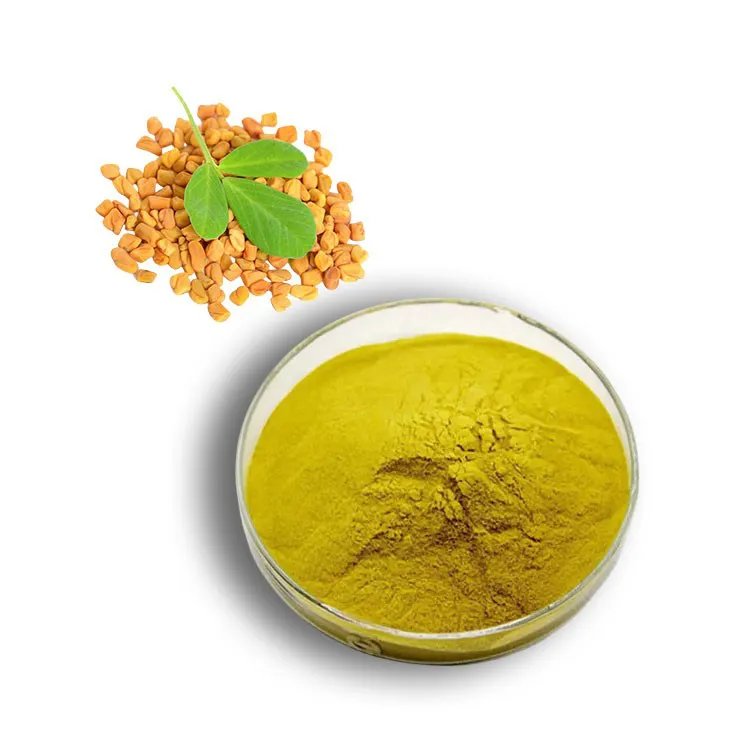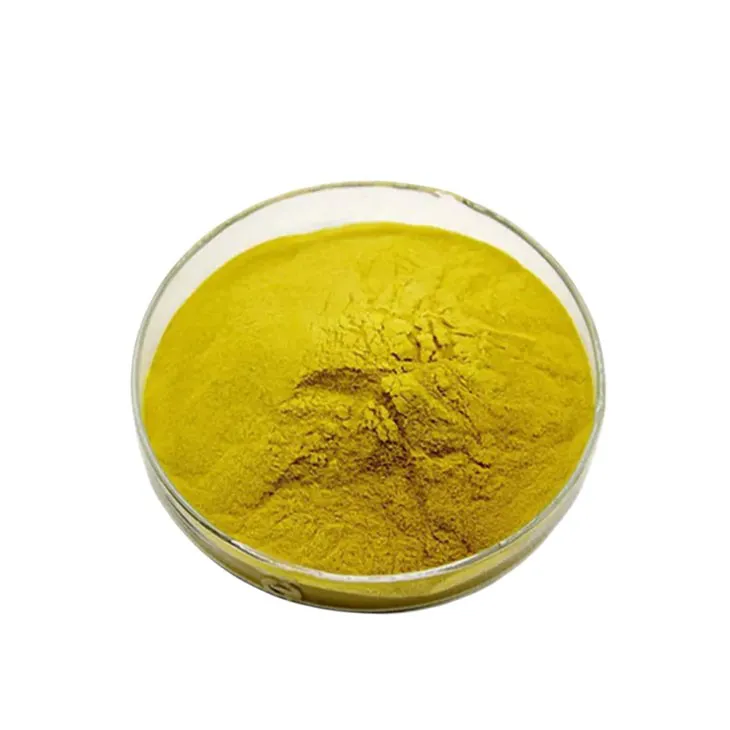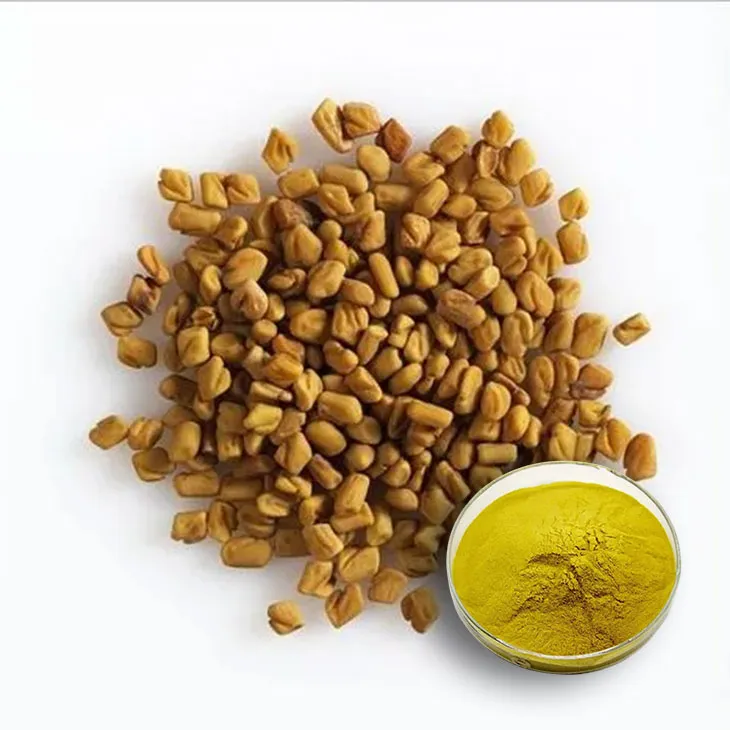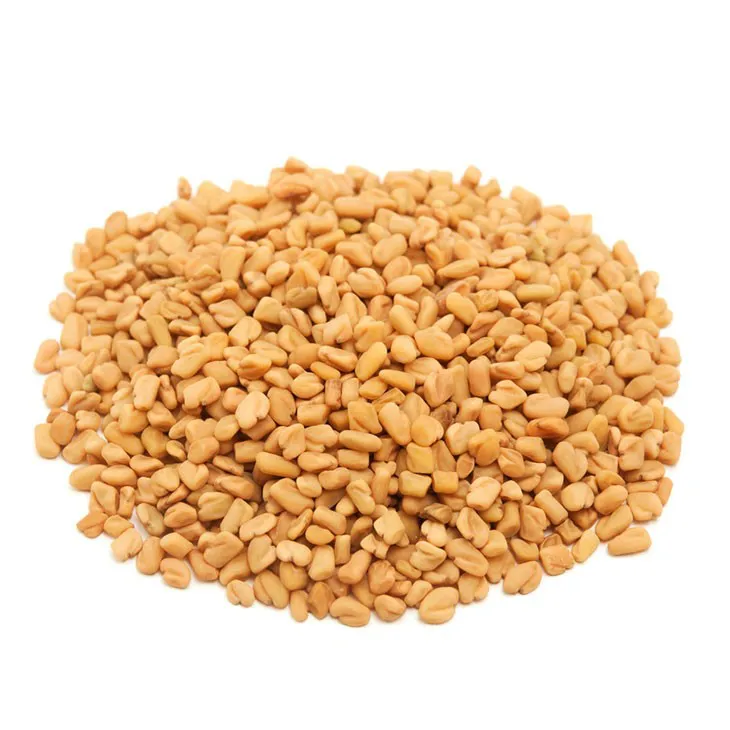- 0086-571-85302990
- sales@greenskybio.com
Extraction process of fenugreek extract powder.
2024-12-01

1. Introduction
Fenugreek Extract Powder has gained significant attention in various fields due to its potential health benefits and diverse applications. The extraction process is crucial in obtaining a high - quality product with the desired properties. This article will delve into the detailed extraction process of Fenugreek Extract Powder.

2. Source of Raw Fenugreek
2.1 Importance of Source Quality
The first step in the extraction of Fenugreek Extract Powder is sourcing the raw fenugreek. The quality of the raw fenugreek is of utmost importance as it significantly impacts the final product. Fenugreek should be sourced from reliable suppliers or grown in optimal conditions. Factors such as the geographical origin, soil quality, and climate during growth can influence the chemical composition of fenugreek. For example, fenugreek grown in nutrient - rich soil may have a higher content of active ingredients compared to those grown in poor - quality soil.2.2 Selection Criteria
When selecting fenugreek for extraction, several criteria need to be considered. Firstly, the variety of fenugreek should be identified. Different varieties may have varying levels of the target compounds. Secondly, the maturity of the fenugreek seeds or plants is crucial. Mature fenugreek is likely to have a more stable and higher concentration of active substances. Additionally, any signs of contamination or damage should be carefully examined. Fenugreek that shows signs of mold, insect infestation, or physical damage should be avoided as it can introduce impurities into the extraction process.
3. Grinding of Fenugreek
3.1 Purpose of Grinding
Once the raw fenugreek is sourced, it is then ground into a fine powder. Grinding serves multiple purposes. Firstly, it increases the surface area of the fenugreek, enabling better interaction with the extraction medium. A larger surface area allows for more efficient extraction of the active ingredients. Secondly, it helps in breaking down the cell walls of the fenugreek, which may contain the desired compounds. By breaking these walls, the extraction process can access the internal components more easily.3.2 Grinding Equipment and Techniques
Various types of grinding equipment can be used for this purpose. A common choice is a grinder or a mill. The choice of equipment depends on factors such as the scale of production and the desired fineness of the powder. For small - scale extraction, a simple home - use grinder may be sufficient. However, for large - scale industrial production, more powerful and specialized mills are required. During grinding, it is important to control the parameters such as the speed of the grinder and the duration of grinding to ensure a uniform and fine powder is obtained. Over - grinding may lead to excessive heat generation, which could potentially damage the active ingredients in fenugreek.
4. Solvent Extraction
4.1 Selection of Solvents
Solvent extraction is a key step in the process of obtaining fenugreek extract powder. The selection of solvents is based on the solubility of the target compounds in fenugreek. Different solvents have different solubilities for various substances. Commonly used solvents in fenugreek extraction include ethanol, methanol, and water. Ethanol is often preferred due to its ability to dissolve a wide range of compounds while being relatively safe and easy to handle. Methanol, although more effective in some cases, is more toxic and requires more careful handling. Water can also be used, especially for extracting water - soluble compounds in fenugreek. However, water - based extraction may also extract unwanted substances along with the active ingredients.4.2 Optimization of Extraction Conditions
During the solvent extraction process, two important factors need to be optimized: agitation and soaking time.- Agitation: Agitation helps in improving the contact between the fenugreek powder and the solvent. This can be achieved through mechanical stirring or shaking. Appropriate agitation can enhance the extraction efficiency by ensuring that all parts of the fenugreek powder are exposed to the solvent. However, excessive agitation may lead to emulsification, especially when using solvents like ethanol. This can cause problems during the subsequent separation process.
- Soaking Time: The soaking time is another critical factor. Longer soaking times generally lead to more complete extraction of the active ingredients. However, there is a limit, as after a certain point, the extraction rate may not increase significantly, and there may be a risk of extracting unwanted substances. The optimal soaking time needs to be determined through experimentation, taking into account factors such as the type of solvent, the fineness of the fenugreek powder, and the target compounds.

5. Filtration
After the solvent extraction, the next step is filtration. Filtration is carried out to eliminate large particles from the extract. This is important as these large particles can interfere with the subsequent processes and affect the quality of the final product. There are different types of filtration methods available, depending on the scale of production and the nature of the particles to be removed.
- For small - scale extraction, simple filtration using filter paper in a funnel can be sufficient. The filter paper can trap the large particles while allowing the liquid extract to pass through.
- In large - scale industrial production, more sophisticated filtration systems such as membrane filtration or centrifugal filtration may be used. These methods can handle larger volumes of extract and can achieve a higher level of particle removal.
6. Concentration of the Extract
Once the extract has been filtered, it is then concentrated. The concentration process is aimed at enhancing the concentration of active ingredients in the extract. There are several methods for concentrating the extract.
- One common method is evaporation. By heating the extract under controlled conditions, the solvent is evaporated, leaving behind a more concentrated solution of the active ingredients. However, care must be taken during evaporation to avoid over - heating, which could damage the active ingredients.
- Another method is ultra - filtration. Ultra - filtration membranes can selectively retain the large molecules of the active ingredients while allowing the small solvent molecules to pass through, thus achieving concentration.
7. Drying
7.1 Importance of Drying
The final step in the extraction process of fenugreek extract powder is drying. Drying not only gives the powder form to the extract but also helps in preserving the properties of the extract. By removing the remaining moisture, the powder can be stored for a longer period without the risk of spoilage due to microbial growth or chemical degradation.7.2 Drying Methods
There are several drying methods that can be used for fenugreek extract powder.- One of the most common methods is spray drying. In spray drying, the liquid extract is sprayed into a hot air chamber. The hot air rapidly evaporates the moisture, leaving behind fine powder particles. Spray drying is suitable for large - scale production as it can handle large volumes of extract and produce a uniform powder with good flow properties.
- Another method is freeze - drying. Freeze - drying involves freezing the extract first and then subjecting it to a vacuum environment. Under the vacuum, the ice in the frozen extract sublimates directly from the solid state to the gas state, leaving behind the dry powder. Freeze - drying is often used for heat - sensitive extracts as it minimizes the exposure to high temperatures, which could damage the active ingredients.
8. Applications of Fenugreek Extract Powder
The fenugreek extract powder obtained through such a meticulous process has potential applications in several areas.
- Pharmaceuticals: Fenugreek extract powder contains compounds that may have medicinal properties. It has been studied for its potential role in managing diabetes, as it may help in regulating blood sugar levels. Additionally, it may also have anti - inflammatory and antioxidant properties, which could be beneficial in the treatment of various diseases.
- Dietary Supplements: Due to its potential health - promoting properties, fenugreek extract powder is often used in dietary supplements. It can be added to products such as capsules, tablets, or powders that are intended to support overall health and well - being.
- Traditional Medicine Systems: In traditional medicine systems such as Ayurveda, fenugreek has been used for centuries. The extract powder can be used in modern formulations of traditional medicine to maintain the authenticity and effectiveness of these age - old remedies.
9. Conclusion
The extraction process of fenugreek extract powder is a complex and multi - step process. Each step, from sourcing the raw fenugreek to the final drying process, plays a crucial role in obtaining a high - quality product. The potential applications of fenugreek extract powder in pharmaceuticals, dietary supplements, and traditional medicine systems make it a valuable product. Continued research and improvement in the extraction process are necessary to further explore its potential and ensure the production of a consistent and high - quality fenugreek extract powder.
FAQ:
What are the key factors in the quality of raw fenugreek for fenugreek extract powder?
The key factors in the quality of raw fenugreek include its origin, growth conditions, and whether it is free from contaminants. Fenugreek from a clean and suitable growing environment, with proper cultivation and harvesting methods, is likely to yield better quality for the extract powder. Also, factors like the variety of fenugreek can play a role in determining the composition and potential of the final extract.
How is the solvent selection determined in the fenugreek extract powder extraction process?
The solvent selection is mainly determined by the solubility of the target compounds in fenugreek. Different solvents have different affinities for various substances. For example, if the target compounds are more soluble in organic solvents like ethanol or ethyl acetate, these may be chosen. Scientists may also consider factors such as the safety of the solvent for the intended use of the extract (e.g., in pharmaceuticals or food supplements), the ease of solvent removal after extraction, and the cost - effectiveness of the solvent.
Why is grinding fenugreek into a fine powder important in the extraction process?
Grinding fenugreek into a fine powder is important because it increases the surface area of the fenugreek. A larger surface area allows for better interaction with the extraction medium. This means that the solvents can access and dissolve the target compounds more effectively, leading to a more efficient extraction process and potentially a higher yield of the desired active ingredients in the fenugreek extract powder.
What is the significance of optimizing agitation and soaking time during extraction?
Optimizing agitation and soaking time is crucial. Agitation helps in mixing the fenugreek powder and the solvent thoroughly, ensuring that all parts of the powder are exposed to the solvent. This promotes better dissolution of the target compounds. The soaking time needs to be optimized because if it is too short, the extraction may be incomplete, and not all the desired compounds will be dissolved. On the other hand, if it is too long, it may lead to the extraction of unwanted substances or degradation of the target compounds.
How does the drying process preserve the properties of the fenugreek extract?
The drying process helps in removing the moisture from the extract. By reducing the moisture content, it inhibits the growth of microorganisms that could spoil the extract. Also, it helps in stabilizing the chemical compounds present in the extract. For example, some active ingredients may be sensitive to hydrolysis or other chemical reactions in the presence of moisture. Drying at the appropriate temperature and conditions helps to maintain the integrity of these compounds and thus preserve the properties of the fenugreek extract powder.
Related literature
- Fenugreek: A Review of Its Botany, Phytochemistry, and Pharmacology"
- "The Extraction and Characterization of Bioactive Compounds from Fenugreek"
- "Advances in Fenugreek Extract Production for Pharmaceutical and Nutraceutical Applications"
- ▶ Hesperidin
- ▶ citrus bioflavonoids
- ▶ plant extract
- ▶ lycopene
- ▶ Diosmin
- ▶ Grape seed extract
- ▶ Sea buckthorn Juice Powder
- ▶ Beetroot powder
- ▶ Hops Extract
- ▶ Artichoke Extract
- ▶ Reishi mushroom extract
- ▶ Astaxanthin
- ▶ Green Tea Extract
- ▶ Curcumin Extract
- ▶ Horse Chestnut Extract
- ▶ Other Problems
- ▶ Boswellia Serrata Extract
- ▶ Resveratrol Extract
- ▶ Marigold Extract
- ▶ Grape Leaf Extract
- ▶ blog3
- ▶ blog4
- ▶ blog5
-
The best lemon juice powder in nature.
2024-12-01
-
Organic Vitamin K2 Powder Suppliers
2024-12-01
-
Bulk purchase of L - tyrosine.
2024-12-01
-
Vitamin K2 Manufacturers
2024-12-01
-
100% Pure Natural Rutin.
2024-12-01
-
Chinese Citrus Bioflavonoid Suppliers.
2024-12-01
-
White mustard seed extract
2024-12-01
-
Hawthorn powder
2024-12-01
-
Marigold Extract
2024-12-01
-
Maca Extract
2024-12-01
-
Eucommia Ulmoides Extract
2024-12-01
-
Lemon Extract
2024-12-01
-
Purple Sweet Potato Extract
2024-12-01
-
Cocoa Extract
2024-12-01
-
Kupilu Extract
2024-12-01
-
Konjac Powder
2024-12-01





















